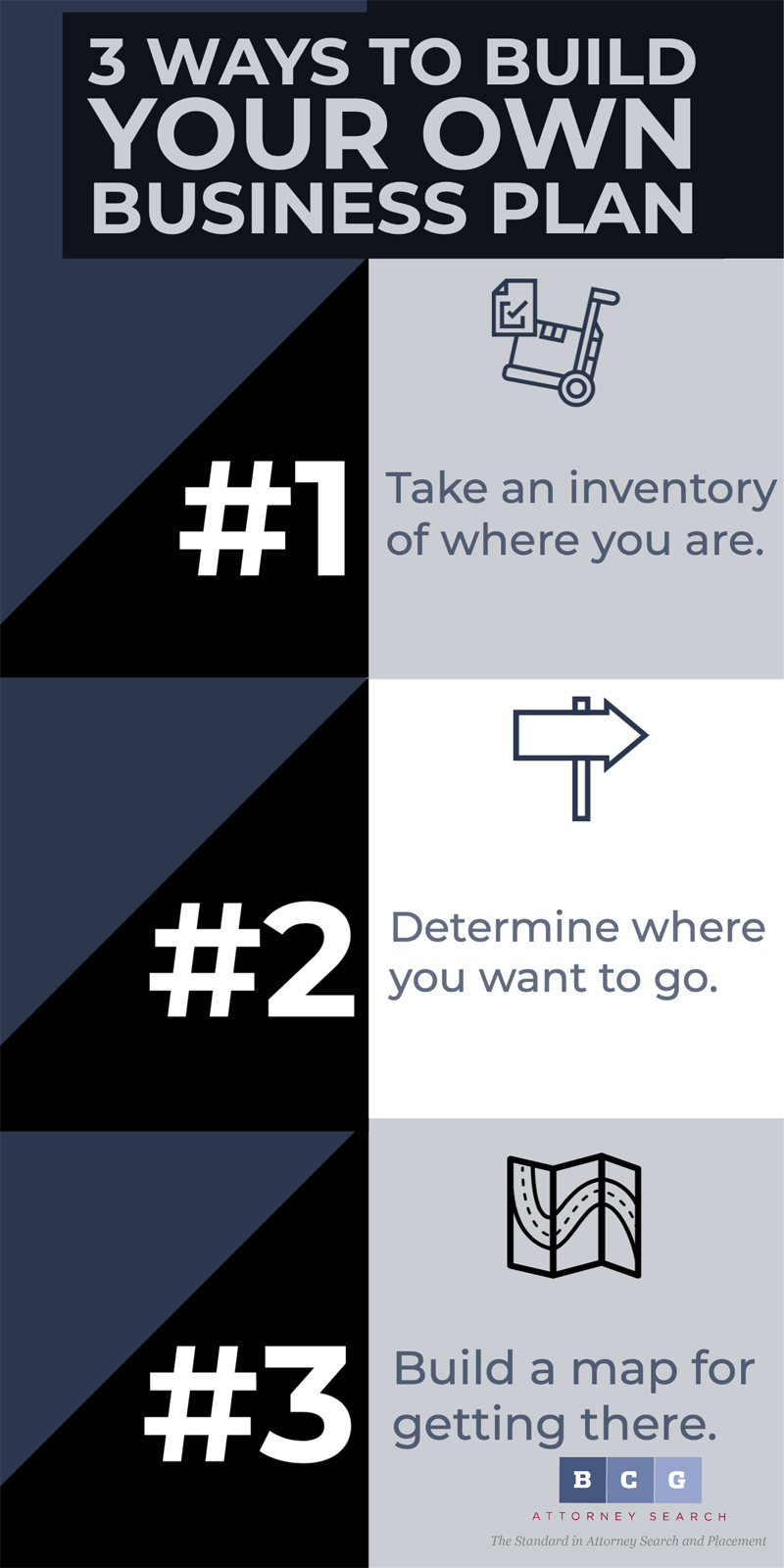- Business plans are a dying art, especially in the legal profession.
- Needless to say, business plans are also essential for a lawyer’s career.
- As the adage goes, if you don't plan your career, someone else will plan it for you.
Summary: Why should you worry about developing personal business plans as an attorney? Learn why this is so important and read some samples to get started planning now.

Many of you work in firms that don't have a business plan for the firm as a whole, let alone your practice group or individual attorneys. And some of you are not privy to the firm's plan, even if there is one.
- If you are interested in seeing the elements of a lateral partner business plan click here: Partner Business Plans: Key Elements
Even so, that's no reason to forgo developing a plan for yourself. Remember, if you don't plan your career, someone else will plan it for you.
Have no fear. Personal business planning is not about writing a 50-page manifesto outlining every detail of every day of your professional life for the next 10 years. In fact, personal business planning can be as simple as you want to make it, as you can see here with this sample business plan for law practice PDF. You don't even have to call it a business plan -- call it a career plan if you prefer.

|
| Harrison Barnes |
No matter how simple you make it or what you call it, personal business planning is about taking inventory of where you are, determining where you want to go and building a roadmap for getting there. Once you have the plan in writing, all you have to do is revisit it periodically to check your course and make any necessary adjustments. To see how a solid plan translates into action, check out From Law Firm to Independence: How to Successfully Start and Thrive in Your Own Law Practice, which shows how attorneys move from firm life into successful solo ventures.

Still skeptical about the usefulness of personal business planning? Consider the following advantages:
- It allows you to chart a career course that matches your specific skills, abilities, and interests.
- It can help you align your own goals with those of your firm.
- It becomes easier for you to review and revisit your goals on a regular basis, making sure that you do not stray too far off course.
- Because it can take years to develop legal business, a business plan focuses you on what you need to do to ensure that you'll have business down the road.
- It will help you and your firm focus time and resources on those opportunities that offer the greatest chances for success.
- It can help you stay focused, even when you're bombarded with new ideas and opportunities. When a vast array of possibilities present themselves, your plan can serve as a personal constitution that forces you to make a careful analysis before making amendments or changing course.
- Finally, a properly written plan will help you measure and recognize the results of your efforts over time.
GETTING THERE
Here are some simple steps you can take to build your own personal business plan:
1. Take an inventory of where you are.
The first step in the personal business planning process is to survey your situation. Often, it helps to ask yourself a series of tough questions. What are your strengths and weaknesses? What practice areas and professional activities most interest you? What is the status of your network and your reputation? How does your personal situation compare with external factors such as your firm's goals and objectives? Are your goals in line with the objectives of your firm? What about the status of your competition, internally and externally? Are you looking to succeed in a field packed with attorneys having similar skills and goals? What are the trends taking shape in your geographic region, in your practice area, and in your clients' industries? Do your goals and objectives capitalize on these trends? Given this analysis, what threats do you need to avoid and what new opportunities can you capitalize on?
2. Determine where you want to go.
You know where you are, but where do you want to go? Think about creating a mission statement for yourself. I know it sounds corny, but the mere exercise of trying to come up with one is enlightening. Answer this question: Why am I practicing law and what do I want to achieve? The answer doesn't have to be unique or earth-shattering -- it just has to answer the question.
Your mission statement doesn't have to be long or eloquent. In fact, you should try to keep it to one sentence. The most important thing to remember is that whether you want to become a partner in your firm, help the less privileged, become a judge, move in-house or start your own firm, your mission is yours and yours alone. Your parents were right: You can do, and be, anything you want.
3. Build a map for getting there.
All that's left is to figure out the steps between your situation and your destination as described in your mission statement. The best way to map out these steps is to start at the end and work your way back to your situation. Here is how your analysis might work:
Establish long-term goals. To accomplish your mission, first think about what long-term goals you will need to achieve. For example, if your mission is to become a partner, you might want to set long-term goals of winning a certain amount of new business or developing a new practice area. You also might speak with those responsible for making partnership decisions, to hear what they want to see you accomplish to support the decision to make you a partner. Once you know their expectations, you can align your long-term goals with their expectations. And you can make exceeding their expectations one of your long-term goals.
If you are already a partner, your mission might be to become one of the firm's top rainmakers. To accomplish this, one of your long-term goals might be to develop a certain percentage of new business from your existing clients over the next two years.
Explore how attorneys have successfully implemented these strategies in Tens of Thousands of Attorneys Have Found Positions with BCG Attorney Search, and You Can Too!.
- Set objectives for this year. To accomplish your long-term goals, think about what objectives you can achieve by the end of the year. To continue the above example, if your long-term goal includes developing new business, you might make it your objective to win two new clients this year that represent a certain percentage of your long-term business development goal.
To develop a new practice area, you might try to work on three projects related to the new practice area. If your goal is to focus on developing new business with existing clients, your objective might be to have a certain number of face-to-face meetings with your clients to discuss their business and legal issues. - Start implementing your strategies today. Finally, to accomplish this year's objectives, think about what short-term strategies or steps you can start taking. For example, to win two new clients, you might determine that you need to build your referral network and become more visible in your practice area. That might mean taking a leadership role in an association, writing articles and giving speeches. You might run for office in a bar association section that interests you. Or you might join Toastmasters, to hone your speaking skills. To identify writing opportunities, you could develop better relationships with key people in your firm's marketing department so that they think of you when there is a suitable writing opportunity.
To accomplish your objective of working on three projects in a new practice area, you might determine that you need guidance and additional skills. Then you could identify a mentor with experience building new practice areas. To acquire new skills, you could take continuing legal education courses or seek opportunities to work on the types of matters that will develop those skills.
To develop additional business from existing clients, you might start by scheduling regular entertainment outings with key clients and in the meantime educate yourself about their businesses. What's going on in their industries? What do their most recent annual reports reveal about their strategies? Who are their primary competitors? What legal needs might these clients have that your firm is not serving?
In the meantime, as you establish yourself with new and existing clients, it might be a good idea for you to establish an individual attorney marketing plan, either through an associate attorney marketing plan, or a partner business plan if you are a partner.
The key to building your roadmap is to make sure that each activity you plan to undertake has a clear deadline and is as specific, objective and measurable as possible: "I will take two CLE courses in complex litigation techniques by June 1" or "I will entertain Mr. Jones from ABC Inc. once each quarter."
Also, when it comes to planning, the biggest land mines are complexity and procrastination. Try to avoid creating a plan that overwhelms you or anyone you tell about it. And remember that any plan is better than no plan at all.
Strive to keep your plan simple and start taking action. As an attorney, you're well-versed in the areas of analysis and logic. In every work matter, you look at the situation and connect the dots to accomplish the desired objective. Apply the same approach to personal business planning and the dots you connect will lead you to the career you've always wanted.
- See 30 Ways to Generate Business as an Attorney for more information.
Frequently Asked Questions
Business Plan For A Law Firm
How Do I Write A Business Plan For A Law Firm?
Firms that practice law are more than just businesses. Lawyers and law firms in general practice a profession with responsibilities beyond purely commercial concerns.
When starting a law practice, it is important to take the right steps. You should be passionate about practicing law, but you should also be familiar with the business side of running your new firm. You might already have plenty of exciting ideas (like what your firm will be called), but it is imperative that you stop and set up a plan so you know where you are going.
When starting out, you must consider what your goals are, how much revenue you will need, and why people should choose you over other lawyers. A law firm business plan is necessary for those situations.
WHAT GOES INTO A BUSINESS PLAN
The creation of an effective business plan will require time and effort. A massive document, however, does not appeal to anyone. Business plans should be kept short to increase the likelihood that they will be read and come to fruition. There is no harm in trying to keep it under 20 pages if you have already covered all the territory you need to at that point.
In other words, what is the territory that needs to be covered? According to most authorities, a sound business plan should address the following broad areas:
Overview of the Firm
The description of the firm should include the following information: its name, legal structure, practice areas, and leadership positions. Additionally, it should provide insight into the firm's identity and aspirations.
This would include:
- A mission statement about the firm’s purpose.
- A vision statement or recitation of medium- and long-term goals for the firm.
- Important aspects of the firm’s history.
- Any important philosophies that the firm brings to legal practice.
Market Analysis
Discuss the factors affecting the firm's most important clients and practice areas in this section. Your firm should assess any technologies that are affecting your practice area and think about how it can take advantage of them. As part of this section, the firm should also identify its major competitors in each of its important practice areas and compare their services with the company's.
Clients
Provide information about the firm's major clients, including their size, location, industry, and practice areas. Consider the prospects and targets of major clients in a similar way. There is a need to examine how the firm can improve its relationships with both of these groups. To see how structured networking aligns with your professional roadmap, check out How Attorneys Can Network: Why Networking is Essential to Attorney Success — it’s a perfect companion to your business planning efforts.
Financials
An organization's fixed and variable costs, upcoming and backward-looking revenue, realization rate, collection rate, monthly overhead, assets, and liabilities are important financial metrics. The business plan should include a 12-month profit and loss projection.
On this front, any firm could get into a lot of detail. Ensure that you are not overwhelmed by the information; at the same time, this is some of the most important information, so you should not gloss over it either.
Operations
The office lease, equipment purchases, and technology plans are among the key operational considerations. For operational issues, staff members may be assigned roles.
Marketing
Imagine what kind of marketing your firm does today, how it gains clients, and what kind of marketing goals it wants to accomplish in the future.
The next step is to draft a brief executive summary at the beginning of the document after these sections are completed. While the summary should be professional, you should also include a sense of optimism. In fact, if you focus on the fundamentals of business management for your company, your future should be bright.
Do Lawyers Write Business Plans?
It is true that lawyers write business plans!!!
Law firm business plans outline your goals and how the firm will be run. The following summary explains how you started your law firm, what your goals are, the services you offer, a budget, and a strategy for attracting clients.
Every law firm needs a business plan since it serves as its roadmap for the future. You can also change your goals, so you do not need to know everything in advance. Your business plan may evolve as you become aware of what you hope to accomplish, who you wish to serve, and what kind of matters you desire to handle. In other words, the sooner you put some thought into your business plan, the better your chances of success will be.
Reflect on what you hope to gain from your practice and then take a step back. The following four points will assist in creating a more precise, impactful, and ultimately lucrative business plan:
1. What are your goals?
An effective plan begins with asking, "Why do I want to run a law firm?" “What do I want to accomplish?” How would I define success?”
You can have more freedom and fulfillment if you own your own law firm instead of just working for someone else. You have more control over your income when you own your own company, in theory.
Consider the following questions to get started:
- What do I want to achieve by starting my own law firm?
- What is the impact I want to have?
- What am I good at?
- How do I want to service my clients?
- What problems do I want to help solve?
- What does success look like after starting this law firm?
If you fail to answer these questions clearly, investing in your dream will feel misguided, even though you may desire to start a law firm.
2. Consider how much revenue you will need.
Once you know what success looks like, determine how much revenue you will need to achieve those goals - and more.
Lawyers earned a median salary of $122,960 in 2019. It is not a small amount but after saving for retirement, paying rent or mortgage, paying off student debt, paying for vehicle maintenance, etc., that number declines rapidly.
Additionally, there is no room for investment in marketing or hiring for your law firm to grow. Write down a number that scares you when estimating how much revenue you will need. If you plan with that number in mind from the start, you will be much more successful.
3. Setting your fee structure
You need to create your fee structure after setting your goals and estimating a few rough numbers. How much you charge depends on your practice area; how much it costs you for business services; and how much others charge on average.
Every client you represent will be different, so each case you handle will also be different. For one project, it may make sense to charge a flat fee, whereas, for another, an hourly rate makes sense. Knowing how your competitors charge and structure their pricing is a good starting point for building your own fee structure.
Once you’ve built your plan, it’s equally important to focus on execution—see Top Strategies for Building a Book of Business and Staying Motivated: Expert Tips for Attorneys for actionable methods to stay consistent and motivated.
4. Determine how many cases you need to meet that revenue goal
The number you came up with above may seem absurd if you only handle two or three cases per month. That is not the case. If our goal is to make $122,960 a year in revenue, then we should charge $3,000 per client, taking into consideration the 2019 median salary.
$122,960 per year in revenue = an average case value of $3,000 = 40 cases per year = 3 – 4 per month.
If you work a few cases per month, $122,960 per year might seem astronomical, however, keep in mind that you are gradually working your way up to it.
Consider your location and practice area when determining the number of cases you will need (even if it feels ridiculous).
How To Create A Law Firm Business Plan?
After you have worked out the basics of your business plan, it is time to put pen to paper. It is easy to get started and lets you make sure that you are in the best possible position for success.
In addition to tailoring your law firm business plan to your particular situation, the following list walks you step-by-step through all the key sections you need to have a comprehensive plan:
1. Executive Summary
A business plan executive summary provides a high-level overview of all key information.
The contents of a law firm business plan can be long and complex, so it is worth planning for a brief high-level overview to keep things simple (Hint: You can write this section last after you have sketched out your plan).
Your executive summary should include:
- Mission statement: One or two sentences describing your firm’s purpose.
- Core values: What values are most important to the firm?
- Major goals: What are your firm’s overarching goals and objectives?
- Unique selling proposition: What sets your firm apart from other firms?
2. Firm Description
The next step is to write your firm's executive summary. Describe your practice and clients in a concise outline, including details such as:
- Service(s): What type of law do you practice? What types of clients do you serve?
- Firm values: Restate your mission statement and core values.
- Legal structure: What sort of business entity are you? Are you in a sole proprietorship or a limited liability partnership?
- Location: Where is the office geographically located? What areas does the firm serve?
- Unique selling proposition: What makes your firm stand out? What technology or services give your firm an edge?
3. Market Analysis
Researching the market beforehand will help you a lot. To determine if other firms offer similar services in your area, visit the bar association listings. What are you offering in high demand? Alternatively, how can you attract potential clients if you are not already? Your marketing message will be significantly influenced by the results of this analysis.
Create a market analysis for your firm, including the following:
- Ideal client: What demographics (like location, age, occupation), needs, and motivations would signify the best client match for your firm, and why?
- Industry description: What is the current and projected size of the market your firm is in? What are the trends in your legal niche?
- Competitive analysis: Who are your direct and indirect competitors, and how are they serving your target market? Where do your competitors succeed? What opportunities are there for your firm?
- Projections: How much can your ideal clients spend on legal services? How much can you charge?
4. Organization and Management Overview
Do others in the firm think you are the best leader for the firm? Provide details about yourself and the key players in your firm in this section:
- Describe what makes you unique and what sets you apart from other applicants.
- If applicable, include what makes each member of your team suitable for their particular roles.
- The organizational chart is a great visual aid if you have a larger practice.
5. Services
Give an overview of the legal services your firm offers (for example, say you practice family law. Do you provide cohabitation agreements? Wills? Prenuptial agreements?) and to who you might provide those services (such as start-up and high-tech companies).
When writing about your services it is important to consider:
- What problems do your potential clients need your help with?
- How can your services uniquely help your clients solve their problems?
- What is the benefit of your services to clients?
- Why would potential clients choose your firm over another firm?
6. Marketing Strategy
Marketing plays a critical role in growing a law firm. It is a helpful tool to help you understand how to stand out from your competitors, how much to charge, and how to attract new clients. Here are some tips for law firms on how to attract new clients.
If you are marketing your law firm, you should consider the following:
- Ideal client: Where would you find your ideal client?
- Marketing goals: Detail what specific outcomes you hope to accomplish through marketing. Goals should include tactical objectives (more clients? Higher billing rates?) and overall objectives (like increased name recognition).
- Unique selling proposition: Restate what sets you apart and makes you uniquely able to best serve your clients.
- Competition: Detail who your competition is—and what they are doing to gain clients. Analyze their marketing strategies and assess where the cost of your services fits in with your competitors.
- Action plan: List the specific actions your firm will take to reach your target market and achieve your marketing goals (this could include a media/advertising strategy).
As your law firm advances in its development, you will also have different marketing requirements. If you want to succeed as a lawyer, you will need to be diligent about marketing your firm. You will also need to identify speaking opportunities, blog, and use social media to gain clients.
7. Financial Plan
The financial plan is the core of your law firm business plan. The most important question you may have for your business is, "What is the cost of running a law firm?".”
When seeking funding like a bank loan, it is important to include as much information about your finances as possible. The first year's budget should be included in your financial plan as you start out.
This could include:
- Revenue goal: How much money you want to make broken down by month.
- Financial projections: What you will really expect to earn, how many cases you think you will have the capacity to take on, and what you will be charging each client each month.
- Budget: A breakdown of your expenses and what your money will be going towards each month.
- Cash flow statement: What you actually earned and spent each month. This is different from your projections and budget and should be updated as the year progresses. You will find that you may have budgeted for something that cost you much less than you originally thought or made more in a month than you projected, these discrepancies should be recorded in your cash flow statement.
8. Start-Up Budget
If you are starting a new law firm, you need a budget that is realistic. In order to do this, you should consider both up-front and day-to-day costs, and account for them in your revenue goals.
In your budget, you should include the following costs:
- Hardware (laptops, printers, scanners, office furniture, etc.)
- Office space (Will you rent, or work from home?)
- Malpractice insurance
- Staff salaries (Are you planning to hire an administrative assistant or paralegal?)
- Utilities (Phone, internet, etc.)
- Practice management software or other technology services
Tip: Check out Willie Peacock's advice here if you are writing a law firm business plan because you do not have much capital at the start (it is feasible!).
Additionally, there are plenty of tools you can use to streamline non-billable tasks so you can devote more time to practicing law. Make sure you look at these options as you plan your operating budget. For further answers to career challenges beyond business planning, review Navigating the Complexities of the Legal Job Market: Answers to Your Toughest Questions.
To complement a solid business plan, learn more about launching your own firm in Taking the Leap: A Comprehensive Guide for Attorneys Starting a Solo Practice.
View the following sample attorney business plans that can help you start your own business plan:
- Attorney Business Plan Sample 1
- Attorney Business Plan Sample 2
- Attorney Business Plan Sample 3
- Attorney Business Plan Sample 4
- Attorney Business Plan Sample 5
- Attorney Business Plan Sample 6
- Attorney Business Plan Sample 7
About Harrison Barnes
No legal recruiter in the United States has placed more attorneys at top law firms across every practice area than Harrison Barnes. His unmatched expertise, industry connections, and proven placement strategies have made him the most influential legal career advisor for attorneys seeking success in Big Law, elite boutiques, mid-sized firms, small firms, firms in the largest and smallest markets, and in over 350 separate practice areas.
A Reach Unlike Any Other Legal Recruiter
Most legal recruiters focus only on placing attorneys in large markets or specific practice areas, but Harrison places attorneys at all levels, in all practice areas, and in all locations-from the most prestigious firms in New York, Los Angeles, and Washington, D.C., to small and mid-sized firms in rural markets. Every week, he successfully places attorneys not only in high-demand practice areas like corporate and litigation but also in niche and less commonly recruited areas such as:
- Immigration Law
- Workers Compensation
- Insurance
- Family Law
- Trust and Estate
- Municipal law
- And many more...
This breadth of placements is unheard of in the legal recruiting industry and is a testament to his extraordinary ability to connect attorneys with the right firms, regardless of market size or practice area.
Proven Success at All Levels
With over 25 years of experience, Harrison has successfully placed attorneys at over 1,000 law firms, including:
- Top Am Law 100 firms such including Sullivan and Cromwell, and almost every AmLaw 100 and AmLaw 200 law firm.
- Elite boutique firms with specialized practices
- Mid-sized firms looking to expand their practice areas
- Growing firms in small and rural markets
He has also placed hundreds of law firm partners and has worked on firm and practice area mergers, helping law firms strategically grow their teams.
Unmatched Commitment to Attorney Success - The Story of BCG Attorney Search
Harrison Barnes is not just the most effective legal recruiter in the country, he is also the founder of BCG Attorney Search, a recruiting powerhouse that has helped thousands of attorneys transform their careers. His vision for BCG goes beyond just job placement; it is built on a mission to provide attorneys with opportunities they would never have access to otherwise. Unlike traditional recruiting firms, BCG Attorney Search operates as a career partner, not just a placement service. The firm's unparalleled resources, including a team of over 150 employees, enable it to offer customized job searches, direct outreach to firms, and market intelligence that no other legal recruiting service provides. Attorneys working with Harrison and BCG gain access to hidden opportunities, real-time insights on firm hiring trends, and guidance from a team that truly understands the legal market. You can read more about how BCG Attorney Search revolutionizes legal recruiting here: The Story of BCG Attorney Search and What We Do for You.
The Most Trusted Career Advisor for Attorneys
Harrison's legal career insights are the most widely followed in the profession.
- His articles on BCG Search alone are read by over 150,000 attorneys per month, making his guidance the most sought-after in the legal field. Read his latest insights here.
- He has conducted hundreds of hours of career development webinars, available here: Harrison Barnes Webinar Replays.
- His placement success is unmatched-see examples here: Harrison Barnes' Attorney Placements.
- He has created numerous comprehensive career development courses, including BigLaw Breakthrough, designed to help attorneys land positions at elite law firms.
Submit Your Resume to Work with Harrison Barnes
If you are serious about advancing your legal career and want access to the most sought-after law firm opportunities, Harrison Barnes is the most powerful recruiter to have on your side.
Submit your resume today to start working with him: Submit Resume Here
With an unmatched track record of success, a vast team of over 150 dedicated employees, and a reach into every market and practice area, Harrison Barnes is the recruiter who makes career transformations happen and has the talent and resources behind him to make this happen.
A Relentless Commitment to Attorney Success
Unlike most recruiters who work with only a narrow subset of attorneys, Harrison Barnes works with lawyers at all stages of their careers, from junior associates to senior partners, in every practice area imaginable. His placements are not limited to only those with "elite" credentials-he has helped thousands of attorneys, including those who thought it was impossible to move firms, find their next great opportunity.
Harrison's work is backed by a team of over 150 professionals who work around the clock to uncover hidden job opportunities at law firms across the country. His team:
- Finds and creates job openings that aren't publicly listed, giving attorneys access to exclusive opportunities.
- Works closely with candidates to ensure their resumes and applications stand out.
- Provides ongoing guidance and career coaching to help attorneys navigate interviews, negotiations, and transitions successfully.
This level of dedicated support is unmatched in the legal recruiting industry.
A Legal Recruiter Who Changes Lives
Harrison believes that every attorney-no matter their background, law school, or previous experience-has the potential to find success in the right law firm environment. Many attorneys come to him feeling stuck in their careers, underpaid, or unsure of their next steps. Through his unique ability to identify the right opportunities, he helps attorneys transform their careers in ways they never thought possible.
He has worked with:
- Attorneys making below-market salaries who went on to double or triple their earnings at new firms.
- Senior attorneys who believed they were "too experienced" to make a move and found better roles with firms eager for their expertise.
- Attorneys in small or remote markets who assumed they had no options-only to be placed at strong firms they never knew existed.
- Partners looking for a better platform or more autonomy who successfully transitioned to firms where they could grow their practice.
For attorneys who think their options are limited, Harrison Barnes has proven time and time again that opportunities exist-often in places they never expected.
Submit Your Resume Today - Start Your Career Transformation
If you want to explore new career opportunities, Harrison Barnes and BCG Attorney Search are your best resources. Whether you are looking for a BigLaw position, a boutique firm, or a move to a better work environment, Harrison's expertise will help you take control of your future.
Submit Your Resume Here to get started with Harrison Barnes today.
Harrison's reach, experience, and proven results make him the best legal recruiter in the industry. Don't settle for an average recruiter-work with the one who has changed the careers of thousands of attorneys and can do the same for you.
About BCG Attorney Search
BCG Attorney Search matches attorneys and law firms with unparalleled expertise and drive, while achieving results. Known globally for its success in locating and placing attorneys in law firms of all sizes, BCG Attorney Search has placed thousands of attorneys in law firms in thousands of different law firms around the country. Unlike other legal placement firms, BCG Attorney Search brings massive resources of over 150 employees to its placement efforts locating positions and opportunities its competitors simply cannot. Every legal recruiter at BCG Attorney Search is a former successful attorney who attended a top law school, worked in top law firms and brought massive drive and commitment to their work. BCG Attorney Search legal recruiters take your legal career seriously and understand attorneys. For more information, please visit www.BCGSearch.com.
Harrison Barnes does a weekly free webinar with live Q&A for attorneys and law students each Wednesday at 10:00 am PST. You can attend anonymously and ask questions about your career, this article, or any other legal career-related topics. You can sign up for the weekly webinar here: Register on Zoom
Harrison also does a weekly free webinar with live Q&A for law firms, companies, and others who hire attorneys each Wednesday at 10:00 am PST. You can sign up for the weekly webinar here: Register on Zoom
You can browse a list of past webinars here: Webinar Replays
You can also listen to Harrison Barnes Podcasts here: Attorney Career Advice Podcasts
You can also read Harrison Barnes' articles and books here: Harrison's Perspectives
Harrison Barnes is the legal profession's mentor and may be the only person in your legal career who will tell you why you are not reaching your full potential and what you really need to do to grow as an attorney--regardless of how much it hurts. If you prefer truth to stagnation, growth to comfort, and actionable ideas instead of fluffy concepts, you and Harrison will get along just fine. If, however, you want to stay where you are, talk about your past successes, and feel comfortable, Harrison is not for you.
Truly great mentors are like parents, doctors, therapists, spiritual figures, and others because in order to help you they need to expose you to pain and expose your weaknesses. But suppose you act on the advice and pain created by a mentor. In that case, you will become better: a better attorney, better employees, a better boss, know where you are going, and appreciate where you have been--you will hopefully also become a happier and better person. As you learn from Harrison, he hopes he will become your mentor.
To read more career and life advice articles visit Harrison's personal blog.






